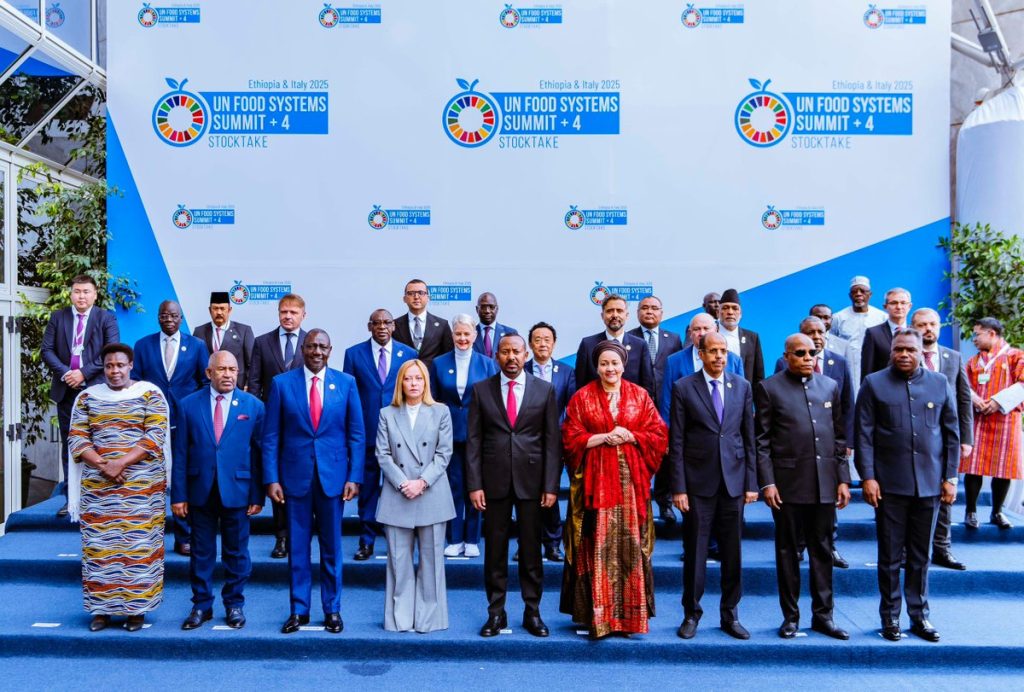Nigeria, alongside other African nations and the United Nations, has issued a forceful call for unified action and resolute determination to combat pervasive food insecurity on both the African continent and a global scale.
The demand for predictable concessional finance to fuel investments in agriculture, rural transformation, infrastructure, and literacy across Africa was a central theme, with leaders stressing the imperative of aligning climate finance with robust food systems.
Speaking at the opening session of the United Nations Food Systems Summit Stocktake (UNFSS+4) in Addis Ababa on Monday, Vice President Kashim Shettima, announced Nigeria’s advanced strategy to enhance agricultural output through cutting-edge technology.
READ ALSO: ‘Survival is our culture’: What identity means to Nigerians
He stated that the nation is now deploying tools such as Artificial Intelligence (AI), geospatial analytics, and satellite-driven climate intelligence to eradicate food insecurity.
The ultimate goal, Shettima emphasised, is to forge a future characterised by abundance, equity, and human dignity.
Acknowledging that food insecurity has become a universal challenge, no longer confined to remote regions, he urged African nations to defy prevailing trends amidst climate change and other global pressures.
“The Fourth Industrial Revolution has not only disrupted the old order but gifted us instruments that were once confined to the imagination,” he declared.
Shettima details how these modern tools are being used to monitor production, boost transparency, connect producers to markets, and minimise waste throughout the agricultural value chain.
Rather than merely exchanging diplomatic pleasantries, Shettima implored summit participants to depart with a resolute conviction in Africa’s potential for success.
He called upon African nations to unite with shared purpose and unwavering determination to achieve continental food security.
“A broken food system in any part of the world diminishes the dignity of humanity as a whole,” he stated, advocating for a world where “no child sleeps on an empty stomach, where no farmer is forgotten, and where food is not a luxury but a human right.”
Shettima further elaborated on Nigeria’s robust institutional reforms, including deepening inter-sectoral partnerships and prioritising agro-industrialisation as a key driver for inclusive growth.
This strategic direction followed the unveiling of Nigeria’s National Food Systems Transformation Pathway, which has translated into targeted investments in infrastructure and human capital development.
He clarified that Nigeria’s declaration of a national emergency on food security was more than a mere alarm; it is the driving force behind the Presidential Initiative on Food Security.
READ ALSO: Calls for new states surge across Nigeria, constitutional hurdles remain steep
This mission, he explained, is designed to significantly increase the cultivation of vital staples such as maize, rice, cassava, and wheat.
These efforts are bolstered by climate-smart innovations, financial inclusion programs for smallholder farmers, and an expansion of extension services, particularly tailored for women and youth.
Additional agricultural investments include the Special Agro-Industrial Processing Zones (SAPZs), which are being developed in collaboration with the African Development Bank and IFAD.
Shettima highlighted these zones as not just production hubs but transformative engines, fostering job creation, attracting private capital, and forging crucial links between rural producers and both national and global markets.
“Our faith in the capacity of our people remains unshaken. But production is not enough. We believe that a sustainable food system must also be a healthy one,” he added.
Extending President Bola Tinubu’s and Nigeria’s gratitude to the host nations, Ethiopia and Italy, Shettima affirmed Nigeria’s readiness to actively engage:
“Nigeria is ready to listen. Nigeria is ready to learn. Nigeria is ready to lead wherever leadership is required. We are here to champion food systems that are resilient in the face of climate shocks, responsive to nutritional needs, and rooted in local realities.
“We are here because we believe that the arc of history does not only bend towards justice. It bends towards food justice.”
Earlier in the summit, Ethiopian Prime Minister Dr Abiy Ahmed underscored the event’s significance as an opportunity to review progress and renew collective commitment to building resilient and inclusive food systems.
Ahmed echoed the call for predictable concessional finance for Africa’s agricultural and rural development, emphasising the vital link between climate finance and food systems, given the deep connection between hunger and environmental degradation.
He highlighted Ethiopia’s launch of a comprehensive roadmap for food system transformation since the first summit in 2021, and its deliberate choice to invest boldly in local production, reduce import dependency, and build a resilient system centred on human dignity.
Speaking via recorded videocast, United Nations Secretary-General António Guterres reiterated that food systems encompass more than just food, touching upon climate, justice, and the right to a better future.
While acknowledging some progress since the last food summit, Guterres warned that it is insufficient, noting the global rise in hunger and how threats and shocks are driving up food prices.
READ ALSO: Hundreds of Nigerians pose as authors to enter UK through visa scheme
He stated that the crisis in the African continent’s Gross Domestic Product (GDP) is fundamentally a crisis of justice, equity, and climate, with climate change actively disrupting harvests, supply chains, and humanitarian responses.
The summit also featured addresses from other prominent figures, including Italian Prime Minister Giorgia Meloni and Kenyan President William Ruto, among other heads of state and representatives from various multilateral organisations.



